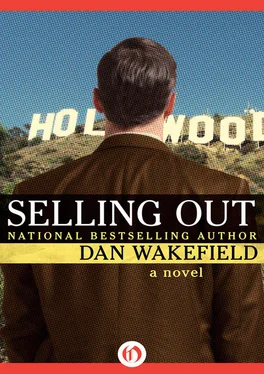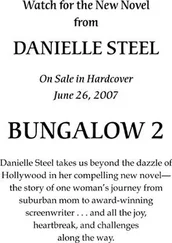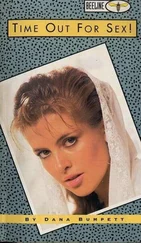Actors. Actors were the best bet. First Perry had thought of Lon Ridings, who had played the scholarly father of Laurie, but his last sight of the poor guy, pressing his near-nude body (except for those damn jockey shorts, for God sake) into the dirt at the side of Ned Gurney’s patio, was too depressing. He didn’t want someone that far down. Then he thought of Ronnie Banks, the young guy they’d all originally wanted for the role of Jack but who was turned down by the network. He seemed like a nice, hard-luck kind of guy who liked to booze it up a little. He had talked to Perry about getting together sometime, and in fact had sent him an invitation to a play he was in, but it was way out in the depths of the Valley in some kind of makeshift little theater in a converted auto-body shop behind a shopping mall. It did not seem likely that Ronnie Banks had just signed a contract for millions for some kind of multipicture deal, and Perry decided he was the ideal guy to meet for dinner.
And now he was hot.
“Hey-ho, no need to sweat it, my man,” Ronnie said when he saw Perry’s obvious dismay, “I’ll only be hot for the next couple days.”
“Hey, listen, I couldn’t be happier for you!” Perry said heartily, trying to cover his embarrassment as well as his guilt. “What’s your good news?”
“Got a bit in a new feature—but don’t worry, it’s only ten lines!” Ronnie assured him as he guided him up to a barstool.
“Congratulations, really. That’s swell.”
“What’s happening?” Ronnie asked. “You look like someone’s got a contract out on you.”
“That’s what I feel like,” Perry admitted.
“Should we make sure to sit with our backs to the wall at dinner?”
“Good idea. Listen, I really can’t talk about it yet—what’s happening. I’ll tell you after I get a few drinks in me, OK?”
Ronnie looked concerned, serious.
“You don’t have to tell me at all, Perry. Whatever it is.”
“But I want to. I’ve got to tell someone.”
Ronnie nodded, and finished off his beer.
“Let’s get a booth and be comfortable,” he said.
“Great.”
Perry was glad they’d come to La Traviata. It was a dim, cozy, inexpensive restaurant on Melrose Avenue in Hollywood where a number of entertainment people, including some stars, hung out when they didn’t feel like being seen. They of course did not become invisible when they drank or dined at La Traviata, but according to some unwritten edict the place was not classified as fashionable, so columnists and their stringers never sniffed around it, no tourists ever heard of it, and local civilians who went there never bothered the stars by hounding them for an autograph while the vulnerable celebrity was in the midst of trying to swallow a long string of linguine. It was rather like a neighborhood restaurant for people who lived in a place so spread out and transient that they really had no traditional-type neighborhood.
Perry didn’t feel like eating at all, but he made himself order. Since nothing sounded appealing to him, he simply ordered things he used to like to eat, in hopes he would like them again—baked clams, veal parmigiana with spaghetti, beefsteak tomato and onion salad, and the house special, creamy cheesecake with fresh strawberries for dessert.
Everything tasted like cardboard. Perry picked at his food and rearranged it on the plate and even made himself swallow a lot of it, but only because he wanted to maintain some pretense of being all right. The only thing he really wanted was the wine, which he poured down not in any appreciation of its taste but rather like a man pouring water on the burning engine of his car in a desperate effort to quench the fire. Before they got to dessert Perry ordered a second bottle of Verdicchio. Ronnie was drinking it too, of course, but tonight he was way behind his thirsty friend.
Perry felt if he just got enough wine inside him he’d be able to confess his shameful new secret, and when at the end of the meal it still seemed too difficult, he was sure that the brandy would enable him to speak freely. The brandy was great—not the taste, which was flat and colorless, like everything else, but the sting to his gums, the burning sensation in his throat.
“Elena— dahling! ” Ronnie exclaimed, and jumped up to greet a svelte, glamorous woman who suddenly loomed above the table, appearing to Perry almost like a vision or dream, a beautiful, slightly wavering image reflected in a clear pond. He knew her, yet did not know her—certainly not as Elena.
“Ronnie, dahling ,” the gorgeous woman cooed in a sexy, familiar voice. Holy God! Of course!
“Ramona Selden!” Perry blurted out, identifying the former call girl of the Washington elite.
But of course that was only on “Checkmate,” the prime-time soap opera that rose to overnight popularity four or five seasons ago, momentarily challenging the numbers of “Dallas” and “Dynasty,” until it for some reason peaked, waned, and was canceled last year.
“Elena Allbright, this is my friend Perry Moss,” Ronnie said in introduction, then added, giggling, “‘Checkmate,’” meet ‘The First Year’s the Hardest.’”
Perry caught his breath as “Ramona Selden” slid into the booth beside him, extending her hand and saying, “Of course, you’re the writer. I loved the pilot—then didn’t they turn it into some kind of cop show?”
“Pretty much,” Perry croaked.
“The first year was the hardest,” Ronnie said.
“Aren’t they all ,” said Elena-Ramona, giving Perry’s wrist a quick, sympathetic squeeze with her long, elegant fingers.
“I loved you!” he declared with feeling, then quickly, to the background accompaniment of Ronnie’s wild giggle, added, “I mean as Ramona Selden of course.”
“Thank you. Wasn’t she a wonderful bitch?”
“You had ’em fooled, Elena,” Ronnie said. “No one could guess Ramona was played by a real cream puff!”
“Come on now, don’t ruin Perry’s image of me, I worked hard at it!” Ramona said, giving Perry a lovely, intimate wink.
“Can you join us for a brandy?” he asked, shocked by his own daring.
“Ooh, I’d love to,” she said, “but I’m meeting my new heartthrob in the bar. I just saw Ronnie and wanted to say hello— and enlist his sympathy in my latest plight.”
“Men?” Ronnie asked.
“Worse,” said the lovely Elena. “Money.”
“Already?” Ronnie asked.
“Broke again,” she nodded.
Perry’s jaw dropped, and he looked quickly at Ronnie and Elena to see if this was some kind of put-on, a comic routine for a newcomer, but they both seemed depressingly serious, even pained.
“I’ve been there,” said Ronnie with a funereal look and a quick hit of brandy, then let go the giggle and said, “Hell, I’m almost there again!”
“Hang tough, pal,” Elena said rising, giving Perry one last thrilling squeeze of the wrist. “Lovely to meet you, Perry. Don’t let this place get to you.”
“Thanks, really, it was really great—” he burbled as she winked and went off, and as he watched her long, shapely legs move in rhythm to her picturesque ass, he called after her, “It was an honor! ”
“Elena’s OK, huh?” Ronnie asked.
“She’s fabulous—but hey, she’s not really broke, is she? What was all that about?”
“Sure she’s broke.”
“Elena Allbright? Ramona Selden? How could she be broke? She’s a star!”
“You don’t think stars go broke?”
Ronnie let out a whistle.
“In this town everyone’s broke—or was once, or will be. It’s built into the system. No matter how much money you make.”
“I feel like you staged this whole thing for my benefit,” Perry said.
Читать дальше












